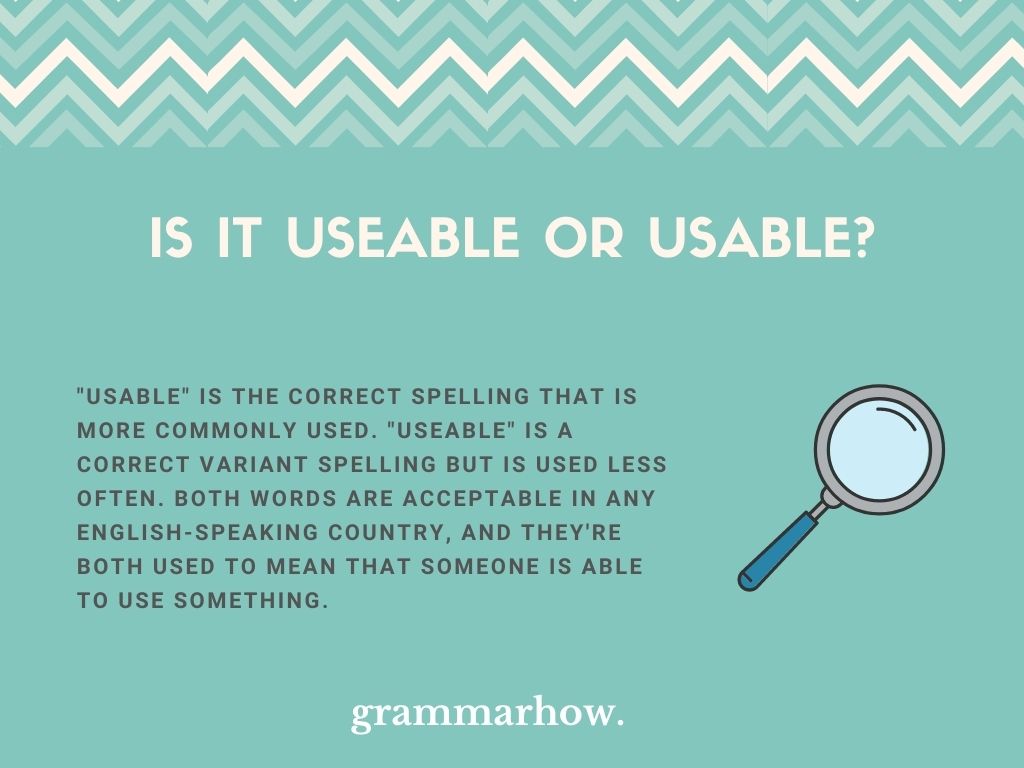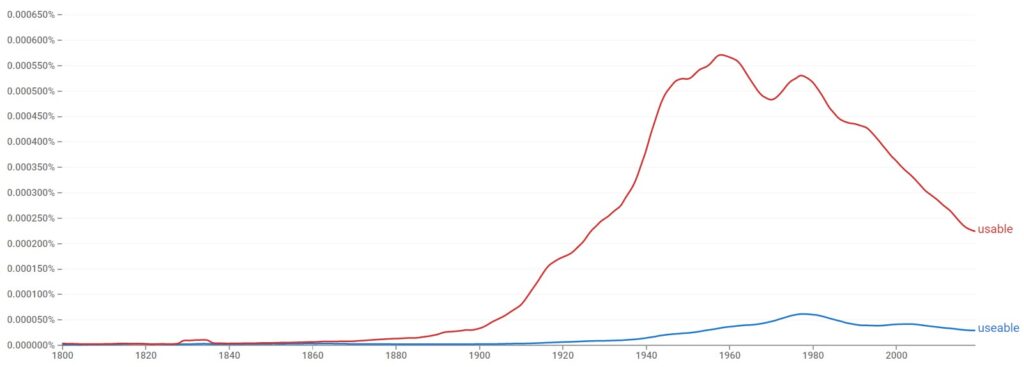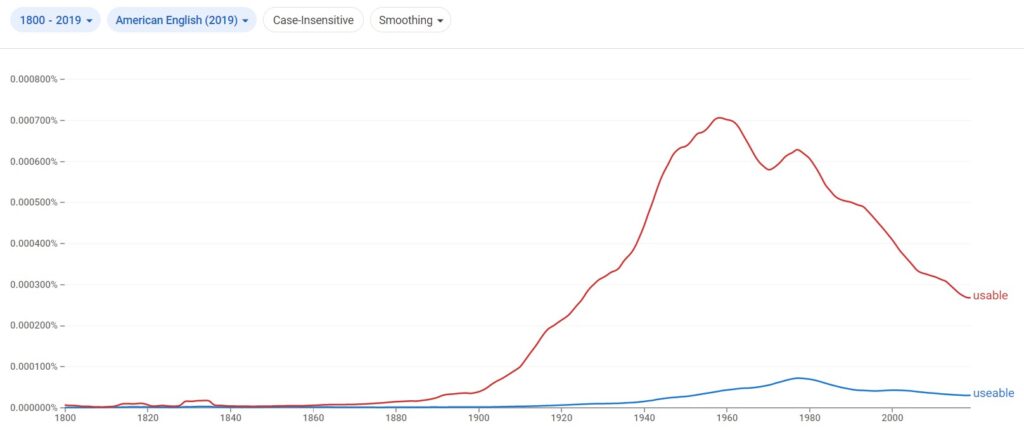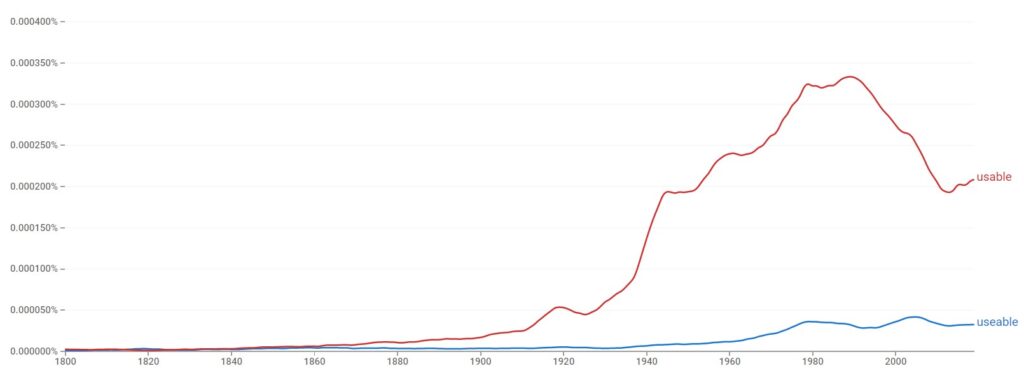The words “useable” and “usable” both mean the same thing, but they’re very clearly different in spelling. So, what makes them different, and why do we have two spellings for the same word? In this article, we’ll find out the answer to that question.
Is It Useable Or Usable?
“Usable” is the correct spelling that is more commonly used. “Useable” is a correct variant spelling but is used less often. Both words are acceptable in any English-speaking country, and they’re both used to mean that someone is able to use something.

Sometimes, spelling variations like this are more apparent between American English and British English. In this article, we will explore both angles and why we might use one variant of the spelling over the other.
What Is The Meaning Of Useable And Usable?
To start, we thought it made the most sense to define the words. Since they’re both the same, they only need one definition.
“Useable” and “usable” both mean that something can be used. It usually refers to a machine or object of some kind with a function that other people can make use of.
According to The Cambridge Dictionary, the definition of “usable” is something “that can be used.”
Interestingly, “usable” is the only recognized spelling of the word in The Cambridge Dictionary. There is no mention of “useable” as a correct form or variant spelling.
Is Useable Or Usable Used The Most?
So, which of the two variations is most common? Well, we’ve already established that “usable” seems to be the most widely accepted and recognized word, but we can take this further with some statistics.
First of all, according to Google, “Useable” is mentioned 436 times on The New York Times website, while “Usable” is mentioned 8,000 times.
That means that “usable” is by far the most popular choice by a margin of about 20 times!
We can also look at this graph to establish a more visual difference between the two words. Again, “usable” is by far the most popular choice, and it was at the peak of its popularity in the mid-1900s (having started to die off slowly since then).

Many people believe that “usable” is the American English spelling while “useable” is the British English spelling, which explains this hefty divide (since there are more people using American English than British English). However, the truth is a little different from that.
Are “Useable” And “Usable” Used Differently In American English And British English?
We can actually put numbers to the usage of the words in both American and British English. Rather than simply telling you that one is used more than the other, we can show you.
If you look at the following graph, it shows the usage of the two words in American English. As you can see, “usable” is by far the most popular choice. In fact, it follows much the same trend as the graph above (since American English has the largest influence on the overall numbers).

We can also look at this graph which shows the British English results. You’ll notice the trendline is much different, but “usable” is still the most popular word. It also seems to be growing in popularity more than it is in American English.

Both American English and British English use “usable” more than “useable.”
There are no real differences between the two, though there is a way to explain why some people might believe there are.
First of all, British English likes to keep the root words and origins of their words when they’re translating them, no matter how confusing they might seem. So, words like “colour” have an extra “U” because “colour” is Old French.
People believe that the root word for “usable” is “use,” so they expect British English to follow the trend and keep the root word and simply add the suffix “-able” to the end of it.
However, the origin of “usable” is actually “usable” in Old French. That’s why British English also uses the term. American English didn’t change the root spelling either, so the two languages use identical spelling variations.
If I Am Not From The UK Or The US – Should I Write Useable Or Usable?
What happens to those countries outside of the UK or the US? Sometimes, they’re left with a very difficult situation trying to figure out what form is correct to use. Luckily, in this case, it’s very straightforward.
No matter which country you’re from, “usable” is the more commonly accepted form. You should always use that no matter what language you speak.
We can refer to other English-speaking countries like Canada or Australia to find out what they use. It’s kept simple because they both write with British English rules (since historically they were part of the British Empire).
That means that both Canada and Australia use “usable” since it’s the British English spelling. However, it’s also the American English spelling, meaning that you don’t have to worry about which variation you use.
Even in non-English-speaking countries, like India, they use British English more often than American English. That helps to keep everything else standard, allowing “usable” to be the correct spelling no matter where you are in the world.
What Are The Variant Spellings Of Usable And Useable?
There is only one variant spelling of “usable.”
“Usable” is the correct spelling. It’s widely recognized as the correct form and comes from the Old French word “usable” of the same spelling.
“Useable” is a variant spelling. Since it means “can be used,” people believe the root word is “use.” Adding the suffix “-able” to the end of a word usually adds the meaning “can be” to it.
That means “useable” means:
- Can be used.
Examples Of How To Use “Usable” Or “Useable” In A Sentence
Let’s go over some examples of the word “usable” in context. We’ll also include the variant spelling “useable” in some of them. This is to demonstrate that, while “useable” isn’t as common, both spellings are recognized and both are correct.
“Usable” and “useable” are synonymous. You can use both to mean that something can be used. “Usable” is the most common spelling.
- This printer is hardly usable anymore! We need a new one.
- His hard drive is unusable; we need to sort this out before he gets back.
- The toilet is useable for anyone who needs it right away.
- Is anything in this building usable for what I need?
- What do you have here that’s usable for me to get to work on?
- This project is useable in plenty of areas around the business.
- We’ve developed software that’s usable no matter where you apply it.
- Is any of this going to be useable in my speech later?
From these examples, you can see that both spelling variations are correct. You can use them interchangeably. However, we’d advise you to stick to one throughout the same passage of writing.
If you switch between the two, you’ll often confuse the reader and leave them wondering whether you know how to spell the word or not. Instead, sticking to one spelling helps to streamline your work and make sure you don’t leave your reader confused.
What Part Of Speech Is Useable And Usable?
When it comes to using the words, it’s good to know what “useable” and “usable” are in terms of speech (or writing).
“Usable” is an adjective. We use it as a descriptive word. You can say “I am” or “it is,” followed by the adjective to describe something that can be used.
When using an adjective like usable, you usually have to include a noun that is being used. Without a noun, the word becomes useless in a sentence. Sometimes, you can get away with it if the context allows it, as follows:
- Is it usable?
While there is no direct noun, “it,” being a pronoun, is what we’re using to ask about the adjective “usable” here. Make sure there’s always a noun present.
How Do You Spell Non Usable?
When you want to use the opposite form of “usable,” it’s good to include the prefix “non-.”
“Non-usable” is the correct spelling. It is a word that is always hyphenated because it’s an adjective we’re using to modify a noun. Make sure to include the hyphen whenever you’re writing it.
The spelling “non usable” is never correct. There should not be a space between the two words.
You might also hear someone using the prefix “un-” before it:
- Unusable
This is another correct spelling variation to say that something can’t be used.
Useable And Usable – Synonyms
Finally, let’s see what synonyms and alternatives we can use in place of either of these spellings. If you’re worried about confusing the variants, these alternatives will be much more useful to you.
- Accessible
Saying that something is “accessible” allows us to access it. That means we can make use of it while we’re working with it.
- Functional
We can also say that something is “functional” meaning it is able to function and work as we expect it to.

Martin holds a Master’s degree in Finance and International Business. He has six years of experience in professional communication with clients, executives, and colleagues. Furthermore, he has teaching experience from Aarhus University. Martin has been featured as an expert in communication and teaching on Forbes and Shopify. Read more about Martin here.
